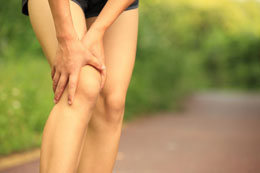Anterior thigh pain is not an unusual case for athletes and also, people who lead a sedentary lifestyle. Identifying the causes correctly is a crucial step before starting treatment approaches for the patient.

Pain in the anterior thigh portion is linked with lower back problems, spine disorders, muscle strains and many other factors. While the intensity of pain is less during rest in most patients, walking and movement activities may worsen the existing condition. But, it is also not unusual to experience pain in thigh when sitting. Anterior thigh pain causes are not specific, so determining the exact reason is very difficult for most patients.
Causes
Frontal thigh pain and associated discomfort problems may stem from injury, muscle strains, nervous disorder, lumbar spinal disease, joint problem, infections, sports hernias and so on. Finding the causes requires thorough physical examination and medical history of the patient, along with imaging tests. For your understanding, some of the probable reasons for anterior thigh pain are discussed below.
Physical Trauma
A physical trauma or injury to the quadriceps muscles is a common cause for front thigh pain. Even if the affected area is posterior thigh, pain may radiate to the anterior portion. A hard blow to a specific area leads to sharp thigh pain. It can be a case of contusion or bruising, and requires treatment for prompt recovery.
Pulled Thigh Muscle
Participating in activities that involve constant use of thigh muscles is the root cause of such pain. In such a case, the thigh muscles are being stretched beyond their limit, resulting in sudden contraction of the muscles. Other symptoms of pulled thigh muscle are pain, swelling, stiffness, bruising and immobility.
Apophyseal Avulsion
Basically a type of sports injury, hip apophyseal avulsion is a reported condition amongst adult athletes. Forceful contraction of the musculo-tendinous while participating in sports events (like jumping or kicking a ball) is the main cause of this fracture. The manifested symptoms include localized swelling, tenderness and loss of function in the affected area.
Slipped Capital Femoral Epiphysis
In children and teenagers, anterior hip pain is most likely due to capital femoral epiphysis. As a result of weak growth plate, the upper end of the thigh bone slips off from the ball of the thigh joint, resulting in pain, stiffness and restricted mobility. Children diagnosed with this problem are at a higher risk of developing osteoarthritis in the later part of their life.
Facet Joint Compression
The front thigh pain is not only restricted to abnormality in the upper or middle spine. In fact, compression of the lower lumbar facet joints (especially in the L4 and L5 regions) should not be neglected while diagnosing this problem. While it mainly leads to lower back pain, weakness, anterior thigh pain and numbness are other reported symptoms.
Other Causes
Inguinal hernias and herniation in the femoral region are also responsible for causing front thigh pain and inner thigh pain. In addition, there are several factors that may contribute to pain in the anterior thigh. Problems like femoral nerve irritation, femoral neck stress fracture, foot pronation, meralgia paresthetica, osteoarthritis, posterior longitudinal ligament stress, ilium hypomobile dysfunction, etc. may cause front hip pain.
Treatment
In most patients, pain in the anterior thigh is accompanied with discomfort symptoms, like swelling, numbness, tightness of muscles and increased muscle tone in the affected area. The symptoms may worsen during standing, sitting, walking, leaning forward or any other activity that puts pressure on the affected area. While some patients complain of sharp pain, others have dull aches that linger for an extended period. The treatment for frontal thigh pain solely depends on what causes the problem. However, taking rest and not pressurizing the pain site are suggested for all patients.
In case anterior thigh pain is caused due to rigorous exercise or sports activities, home treatment involves applying ice compresses. Wrap some ice cubes in a clean towel, and place it over the pain area. This will numb and soothe the symptoms. Likewise, pain due to sprain can be reduced effectively with hot compresses, cold compresses and elevation therapy. Nevertheless, if the root cause of thigh pain is something to do with nerve disorder, bone infection and/or spine problem, taking help from a medical practitioner is necessary for receiving correct treatment courses.


 Pain in the anterior thigh portion is linked with lower back problems, spine disorders, muscle strains and many other factors. While the intensity of pain is less during rest in most patients, walking and movement activities may worsen the existing condition. But, it is also not unusual to experience pain in thigh when sitting. Anterior thigh pain causes are not specific, so determining the exact reason is very difficult for most patients.
Pain in the anterior thigh portion is linked with lower back problems, spine disorders, muscle strains and many other factors. While the intensity of pain is less during rest in most patients, walking and movement activities may worsen the existing condition. But, it is also not unusual to experience pain in thigh when sitting. Anterior thigh pain causes are not specific, so determining the exact reason is very difficult for most patients.